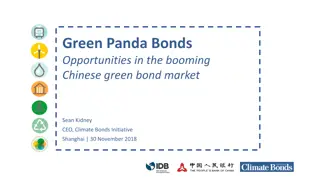
Changing Trends in Graduate Employment Market
Explore the evolving landscape of graduate employment, including shifts in skills demand, HE expansion, and the impact of economic recessions. Discover insights from data surveys on skills and employment, as well as a new indicator for classifying graduate jobs based on skills specialization.
Download Presentation

Please find below an Image/Link to download the presentation.
The content on the website is provided AS IS for your information and personal use only. It may not be sold, licensed, or shared on other websites without obtaining consent from the author. If you encounter any issues during the download, it is possible that the publisher has removed the file from their server.
You are allowed to download the files provided on this website for personal or commercial use, subject to the condition that they are used lawfully. All files are the property of their respective owners.
The content on the website is provided AS IS for your information and personal use only. It may not be sold, licensed, or shared on other websites without obtaining consent from the author.
E N D
Presentation Transcript
Employment in Graduate Jobs Francis Green Professor of Work and Education Economics, UCL IoE Co-author: Golo Henseke 1
Mass HE and the Supply of Graduate Labour 80 Gross Enrolment Ratio Tertiary Education (%) 80 Proportion in LF with Tertiary Education (%) 70 70 60 60 50 50 40 40 30 30 20 20 10 10 0 0 1971 1974 1977 1980 1983 1986 1989 1992 1995 1998 2001 2004 2007 2010 2013 Female (GER) Male (GER) Female (LF) Male (LF) 2
The changing graduate labour market Recent period has seen BOTH: Ongoing rapid expansion of HE, with expansion of graduate share Ongoing changing skills demand The Great Recession How resolved so far? 3
A new indicator of graduate jobs: SOC(HE)_GH Jobs are classified based on typical skills level requirement and skills specialisation Linked to the Standard Occupational Classification Aim is to classify the minor groups (at 3-digit level) 4
Data: skills and employment surveys Date Survey Sample Size 1986 Social Change & Economic Life Initiative 4047 1992 Employment in Britain Survey 3855 1997 2001 Skills Survey Skills Survey 2467 4470 2006 Skills Survey 7787 2012 Skills and Employment Survey 3200 5
Skills indices Degree or equivalent required to do job Degree requirements in similar jobs High-level generic skills: Making presentations, influencing others, thinking ahead, planning own activities, analysing complex problems, specialist knowledge, reading and writing long documents, advanced mathematics Complex or advanced computer use Supervisor responsibilities Job Variety Non-routine (ie. Few or no short, repetitive tasks) Two years or more training for the type of work 6
Method: Step 1 Step 1: We calculate the effect of each of high-skilled task on the propensity for a job to require a level 4 qualification. We do this using a probit model , using nearly 18,000 observations taken from successive SES surveys. For each job (worker), we then compute a score, which summarises to what extent a degree is required to carry out this job competently, given the reported high- skilled tasks 7
Method: Step 2 We compute the average predicted score in each "minor group" (3-digit) 8
Method: Step 3 We ran a statistical "cluster analysis" to determine two clusters, and optimal threshold. It groups each case (minor group) in one or other cluster: graduate or non-graduate 9
Graduate Skills Requirements Index by Major Groups (SOC 2010) 2 Graduate Skills Requirement Index (GSRI) 1 0 threshold -1 -2 1 2 3 4 5 6 7 8 9 10
Validation of SOC(HE)_GH close to concept plausible distribution by occupation group Criterion validity. Graduate jobs should: pay more wages make better use of graduates' skills be well-matched with graduates Compared with all other indicators, SOC(HE)_GH is best or equal best on all counts 11
What's the difference? most groups in SOC major groups 1-3 some clear exceptions: Managers and Directors in Retail and Wholesale Sports and Fitness Occupations Managers and Proprietors in Hospitality and Leisure Services 12
Most frequent occupations among underemployed graduates 25-60 years old, 2012 Occupation (main job) % 4159 Other administrative occupations nec 4.7 4122 Book-keepers, payroll managers and wages clerks 4.3 6145 Care workers and home carers 3.8 6125 Teaching assistants 3.8 7111 Sales and retail assistants 3.5 1190 Managers and directors in retail and wholesale 3.4 6141 Nursing auxiliaries and assistants 2.6 4112 Civil service admin officers and assistants 2.4 4215 Personal assistants and other secretaries 2.1 13
Decomposing the Growing Share of Graduate Jobs 14.0% 12.0% 10.0% 8.0% 10.3% 9.0% 6.6% 6.0% 4.5% 3.4% 4.0% 2.0% 3.6% 3.4% 3.0% 2.4% 2.1% 0.0% Men Women Age<40 Age>=40 ALL occupational upskilling employment growth 14
The match with graduates? So far so good Match with graduate jobs, 97/01 to 06-12: Graduates as % of employment: 30% Graduate jobs as % of employment: 31% ----------------------------------------------------------------------- Median "returns" (=wage gap) held steady ------------------------------------------------------------------------ But there is differentiation: by grade, subject, hierarchy. Probably growing.... 42% 41% 15
Wage Gap over Time (2006/12 vs 1997/2001) 0.65 0.6 0.55 0.5 0.45 1997-2001 0.4 2006-2012 0.35 0.3 0.25 0.2 25th median 75th 16
Log wage penalty for underemployed graduates -0.2 -0.25 -0.3 1997-2001 -0.35 2006-2012 -0.4 -0.45 -0.5 All Men Women 17
Graduate Employment Clouds? UK graduate underemployment relatively high ongoing rise in supply of graduates Demand uncertainty: ongoing hollowing out? maturity of existing ICT? the difference in new-wave automation? Brexit-led recession 18
The prevalence of graduate jobs* in international comparison. 50.0 Proportion of Graduate Jobs (%) 45.0 40.0 35.0 30.0 25.0 20.0 15.0 10.0 5.0 0.0 19
"Under-employed" graduates Observed Skills Adjusted 60.0% 50.0% 40.0% 30.0% 20.0% 10.0% 0.0% Norway United States Italy Slovakia Korea United Kingdom Ireland Sweden Estonia Netherlands France Canada Belgium Poland Germany Cyprus Denmark Finland Spain Czech Japan Austria 20
Other outcomes for HE? Evidence suggests: wider benefits for individuals (e.g. health) external benefits: (e.g. civic participation, volunteering, social trust) 21
Implications take underemployment seriously full information; recognise differentiation re-energise broader purposes of HE/ + benefits that are independent of employment in graduate jobs. Evidence suggests: wider benefits for individuals (e.g. health) external benefits: (e.g. civic participation, volunteering, social trust) 22
Our work at LLAKES and CGHE Green, F. and G. Henseke (forthcoming). "The Changing Graduate Labour Market: Analysis Using a New Indicator of Graduate Jobs". IZA Journal of Labor Policy. ---------------------------------- studying the differentiation in the economic and other returns to HE for many developed countries differentiation within the labour market, and/or within HE itself 23






















